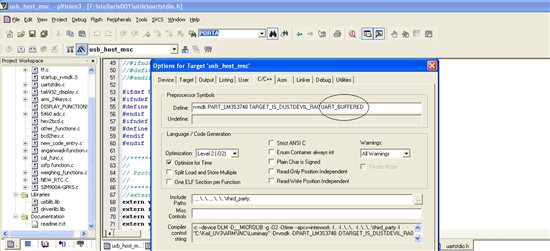Other Parts Discussed in Thread: LM3S5632, LM3S8962, EK-LM3S8962
Hi ,
I am working on a project in which i had interfaced GSM module with LM3S5632 board through UART. I am using another PC which is acting like a server and another is as client (CortexM3 + GSM ).
Using above setup i am sending a string of 20 characters ,but receiver is unable to receive full 20 character.
Later i tried to check whether UART is working properly or not ,i took 2 LM3S5632 based board & treated one as transmitter & another one as receiver & then tried various combinations of string ,but again i found receiver board is unable to receive the full string .
Please find below the UART testing results.
Also Please find the attached zip file for UART testing code.
Kindly help me out.[
View:http://e2e.ti.com/cfs-file.ashx/__key/communityserver-discussions-components-files/908/8765.TEST-CODES.rar]
|
Array send from transmitter |
Array received at receiver end(observed on hyper terminal) |
Array accepted by UART,Remaining data discarded |
|
a ,b ,c ,d ,e ,f ,g ,h ,i ,j ,k ,l, m ,n ,o ,p ,q ,r ,s ,t ,u ,v , w ,x ,y ,z
|
a ,b ,c ,d ,e ,f ,g ,h ,i ,j ,k ,l, m ,n ,o ,p ,q ,r ,s ,t ,u ,v , w ,x ,y ,z
|
a ,b ,c ,d ,e ,f ,g ,h , i ,j ,k ,l ,m ,n ,o ,p |
|
1,2,3,4,5,6,7,8,9,0,1,2,3,4, 5,6,7,8,9,0 |
1,2,3,4,5,6,7,8,9,0,1,2,3,4,5,6,7,8,9,0 |
1,2,3,4,5,6,7,8,9,0, 1,2,3,4,5,6 |
|
1,a,2,b,3,c,4,d,5,e,6,f,7,g,8,h,9,i,0 |
1,a,2,b,3,c,4,d,5,e,6,f,7,g,8,h,9,i,0,
|
1,a,2,b,3,c,4,d,5, e,6,f,7,g,8,h |


